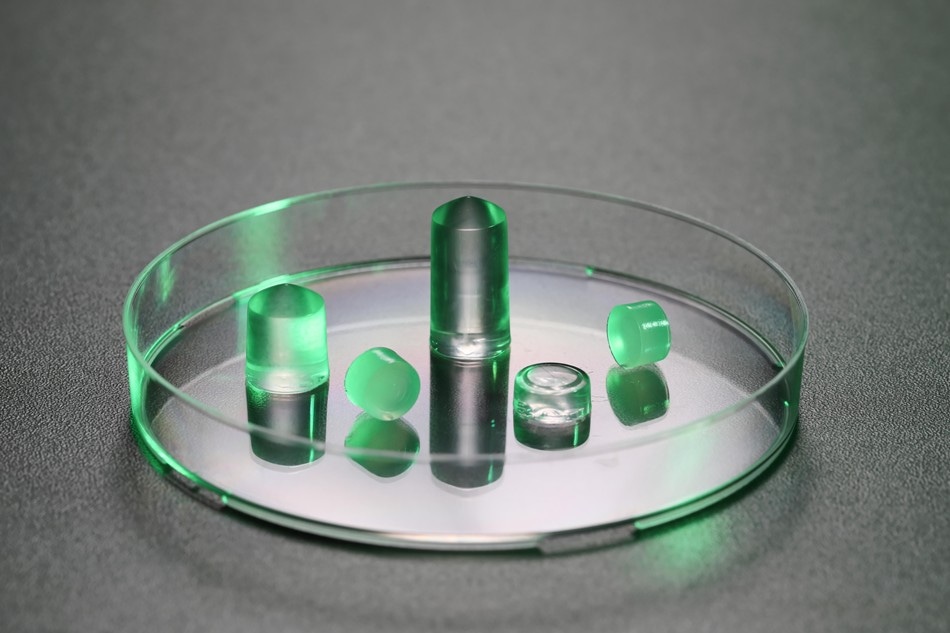Nov 21 2018
An innovative hydrogel, which is composed of almost 90% water and naturally sticks to soft tissue like the meniscus and cartilage, has now been developed by EPFL researchers. If repair cells are carried by this hydrogel, then damaged tissues can be healed effectively.
 The hydrogel developed at EPFL. (Image credit: EPFL)
The hydrogel developed at EPFL. (Image credit: EPFL)
When certain types of body tissue like meniscus and cartilage are damaged, they cannot heal themselves because they either have little or no blood supply. One potential method to overcome this problem would be to inject a hydrogel loaded with drugs or repair cells into the affected area so as to stimulate tissue regeneration.
Yet, when commercially available hydrogels are applied to the treatment area, they do not stay put due to pressure from the flow of bodily fluids and also due to the movements of the body. Hence, in order to keep the hydrogel in place, doctors apply special types of membranes; however, those membranes are joined with sutures that penetrate the very tissue that is supposed to be healed by the hydrogel.
Now, a pair of EPFL research teams, headed by Dominique Pioletti and Pierre-Etienne Bourban, has developed a biocompatible hydrogel that naturally sticks to soft tissues like the meniscus and cartilage. The new hydrogel, which is made up of nearly 90% water, can tolerate extensive deformation and mechanical stresses, thus removing the necessity for a separate binding process. The study has been reported in ACS Applied Materials & Interfaces.
Our hydrogel is ten times more adhesive than currently available bioadhesives on the market such as fibrin. And thanks to its high water content, our hydrogel is very similar in nature to the natural tissue it’s designed to heal.
Dominique Pioletti, Head of the Laboratory of Biomechanical Orthopedics, School of Engineering, EPFL
Composite double-network hydrogel
In fact, the novel hydrogel is a composite material that contains a fiber network and a double-network matrix. This structure maintains the strong adhesive capacity of the material by blunting the effect of mechanical stresses.
The double network structure distributes incoming mechanical energy throughout the hydrogel, so that the material shows adhesion improvement when it is compressed or stretched. In hydrogels that lack these damping mechanisms, the mechanical stresses are concentrated on the interface between the hydrogel and the tissue, and the hydrogel comes off quite easily.
Dominique Pioletti, Head of the Laboratory of Biomechanical Orthopedics, School of Engineering, EPFL
According to Martin Broome, the article’s co-author and who heads the Oral and Maxillo-Facial Surgery Department at the University Hospital of Lausanne (CHUV), this form of hydrogel can possibly make a real difference. “If we build on the hydrogel’s remarkable adhesive properties, that could open the door to a large number of potential applications. One day, for example, it might be used in place of metallic materials like titanium to set bone fractures. More immediately, we may no longer need to use complex sutures on some types of soft tissue.”
The EPFL-developed hydrogel can stick to different types of tissue in its current form. The researchers are now planning to customize this hydrogel for particular applications.
Now that our material has demonstrated its superior mechanical properties, we are going to work on loading it with different agents that could help heal a patient’s cartilage or meniscus.
Dominique Pioletti, Head of the Laboratory of Biomechanical Orthopedics, School of Engineering, EPFL
The study was supported by the Swiss National Science Foundation (CR23I3_159301).
New hydrogel adheres firmly to cartilage and meniscus
Video credit: EPFL